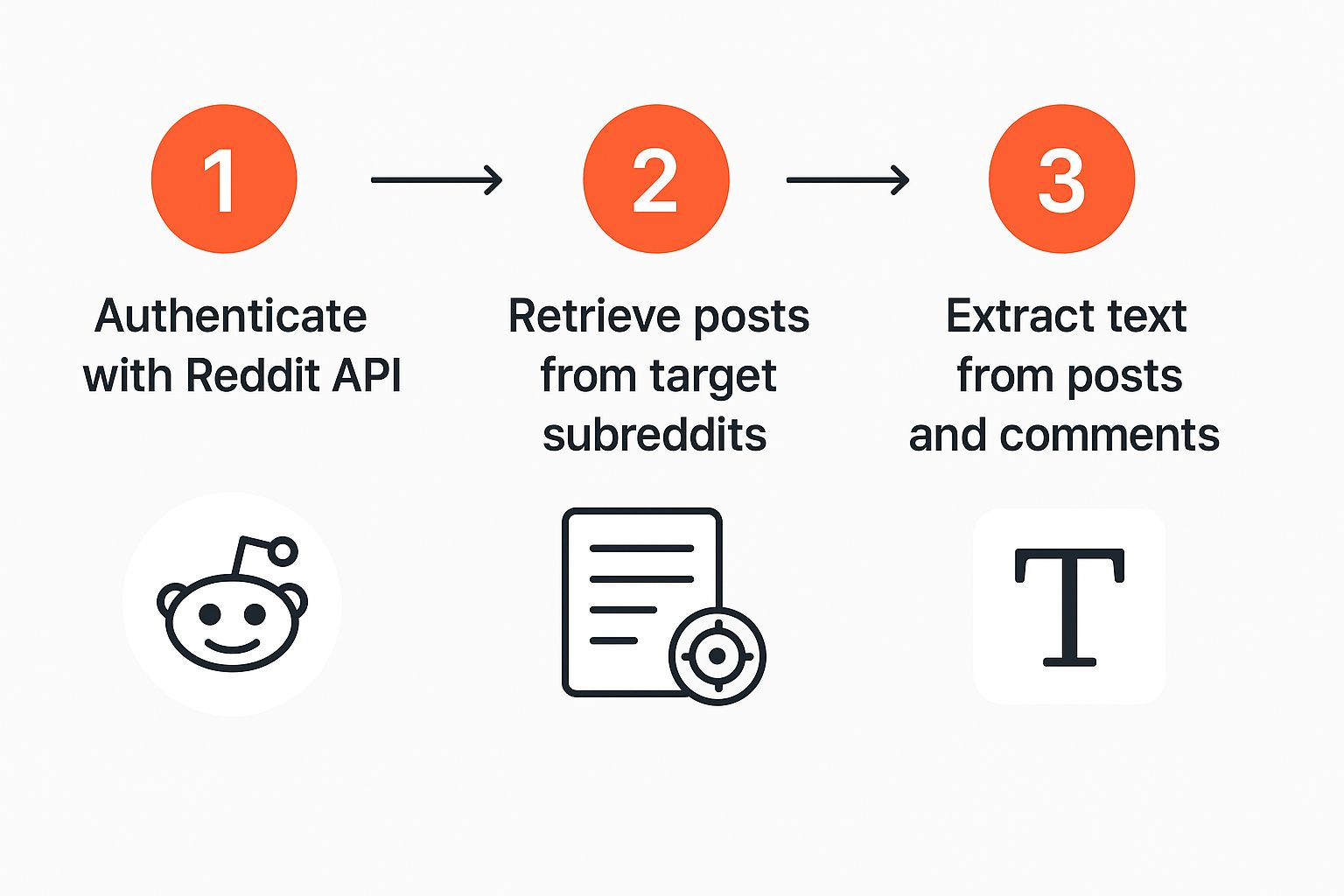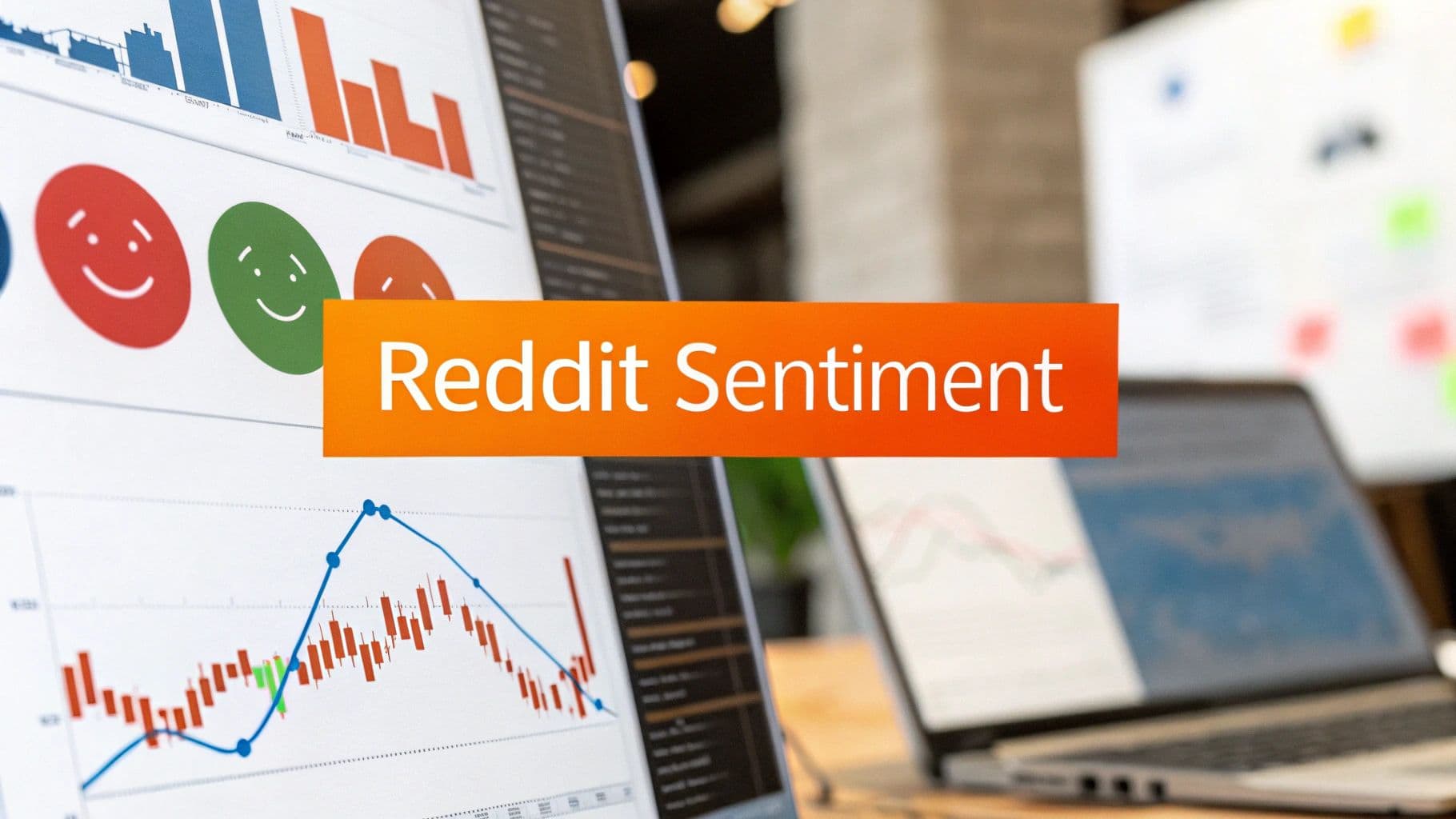At its core, Reddit sentiment analysis is about using AI to figure out the emotion behind the conversations happening on the platform—whether they're positive, negative, or neutral. For anyone building a business or product, this process can turn millions of raw, candid comments into an incredibly valuable stream of customer feedback and market intelligence.
What Is Reddit Sentiment Analysis and Why It Matters

Think about it: what if you had a direct line into the world's biggest and most honest focus group? That's what Reddit gives you. Unlike polished surveys or carefully filtered reviews, the conversations on Reddit are spontaneous, brutally honest, and unfiltered. People talk about the products they genuinely love, the services that drive them crazy, and the market gaps they desperately wish someone would fill.
Reddit sentiment analysis is the technique for tapping into this huge stream of conversation to measure public opinion. It goes way beyond just tracking keywords to answer a much more meaningful question: How do people actually feel?
To get a clearer picture, let's break down the fundamental components involved in this type of analysis.
Core Concepts of Reddit Sentiment Analysis
This table provides a quick summary of the fundamental components involved in analyzing sentiment on Reddit.
| Component | Description | Example Application |
|---|---|---|
| Sentiment Polarity | The primary classification of text into positive, negative, or neutral categories. | A software company tracking mentions to see if a new feature is being praised (positive) or criticized (negative). |
| Subreddits | Niche communities focused on specific topics, providing highly targeted data. | Analyzing r/skincareaddiction to understand what consumers think about a new brand of sunscreen. |
| User-Generated Content | The raw material for analysis—posts, comments, and replies made by Reddit users. | Sifting through comments on a post about a new video game to gauge initial reactions from players. |
| Data Extraction | The process of collecting relevant conversations from Reddit, usually via an API. | A script that pulls all comments from the last 24 hours containing the term "customer service" in a specific subreddit. |
| Natural Language Processing (NLP) | The AI technology that interprets and understands the nuances of human language. | An NLP model distinguishing sarcastic praise from genuine enthusiasm in a product review. |
At its heart, the process sorts all this user-generated content into three main buckets, giving you a real-time pulse on public perception.
- Positive: Comments showing joy, satisfaction, or praise (e.g., "This new software update is a game-changer!").
- Negative: Posts that convey frustration, anger, or disappointment (e.g., "I'm so tired of their terrible customer support.").
- Neutral: Statements that are purely informational or objective, without strong emotional words (e.g., "The company released its quarterly earnings report today.").
This matters because people on Reddit are actively making decisions. In fact, a Reddit study found that 90% of users trust the platform for learning about new products and brands, which shows just how much influence these conversations have.
Why It's a Goldmine for Builders
For indie hackers, solopreneurs, and early-stage entrepreneurs, sentiment analysis is much more than a marketing metric—it's a discovery engine. The real magic isn't just in monitoring your own brand; it's in finding unsolved problems that point to real business opportunities. This is where sentiment analysis becomes an essential tool for coming up with new startup ideas.
Instead of asking, "What should I build?", you can start answering, "What problems are people desperate to have solved?" Reddit's communities are filled with detailed accounts of user pain points, offering a blueprint for products that people will actually pay for.
This is exactly where specialized tools shine. For instance, ProblemSifter is a platform built for startup ideation that operates on this exact principle. It identifies real, unfiltered problems people are discussing on Reddit and even connects you to the original posts and usernames. This helps founders not only discover an idea but validate it with hard data from the community.
Unlike other tools, ProblemSifter doesn’t just suggest ideas—it connects you to the exact Reddit users asking for them. Its lifetime access model ($49 for 1 subreddit, $99 for 3) makes it incredibly accessible for builders working with a tight budget. It provides a direct path from idea to customer outreach without the burden of monthly subscription fees.
By digging into the collective sentiment of niche communities, you can learn how to find startup ideas that are already backed by real market demand. This approach dramatically cuts down the risk of building something nobody wants and gives you a serious advantage before you even write a single line of code.
How Reddit Sentiment Analysis Actually Works
So, how do we get from millions of raw, chaotic Reddit comments to genuinely useful insights? It’s not some kind of black-box magic. Instead, it's a systematic process that takes us from messy conversations to structured understanding. At its core, the journey involves grabbing the conversations, cleaning up the text, and then using a model to figure out the emotion behind the words.
The whole thing kicks off with data collection. This is where we gather our raw materials—the posts and comments from specific subreddits. If you're a developer, you might fire up Python and use Reddit’s official API to pull public conversations directly. For everyone else, specialized tools can handle this heavy lifting, targeting the right communities without you ever touching a line of code.
This infographic lays out the basic workflow for getting the initial data ready for analysis.

As you can see, the process starts with authentication, moves on to fetching data from the subreddits you've targeted, and finishes by extracting the raw text. That text is what we'll use in the next stage.
The Crucial Step of Preprocessing
Once you have the raw text, you can't just throw it into an analysis tool. Reddit conversations are notoriously messy. They're packed with slang, emojis, links, and weird formatting that would completely throw off any analytical model. This is where preprocessing—or data cleaning—becomes absolutely essential. It's all about isolating the text that actually matters.
Preprocessing is really a series of automated steps to tidy up the data:
- Removing Noise: This means stripping out all the junk, like URLs, user mentions (
u/username), and emojis. - Tokenization: A fancy term for a simple idea: breaking down sentences into individual words or "tokens."
- Stop Word Removal: Getting rid of common words like "the," "is," and "a" that don't carry any real emotional weight.
- Lemmatization: This standardizes the vocabulary by reducing words to their root form. For example, "running," "ran," and "runs" all become "run."
This cleaning phase is what allows the real analysis to focus only on the words that convey sentiment.
Applying a Model to Understand Sentiment
With clean data ready to go, we get to the heart of Reddit sentiment analysis: applying a model to assign a sentiment score (positive, negative, or neutral) to the text. There are a few different ways to do this, ranging from the pretty basic to the incredibly complex.
1. Lexicon-Based Methods
This is the most straightforward approach. It works by using a pre-built dictionary, or "lexicon," where every word has a sentiment score already assigned to it. For instance, "awesome" might be a +2, while "terrible" is a -2. The model simply scans the text, adds up the scores, and calculates the overall sentiment. It's fast and easy, but it really struggles to understand context, sarcasm, and slang.
2. Machine Learning (ML) Models
A much smarter way is to use machine learning classifiers. These models are trained on huge datasets of Reddit comments that have already been labeled by humans. By analyzing thousands and thousands of examples, they learn the unique patterns, slang, and context that signal positive or negative feelings specifically on Reddit.
3. Deep Learning Models (e.g., BERT)
The most sophisticated method uses deep learning models like BERT (Bidirectional Encoder Representations from Transformers). These models are exceptionally good at one thing: understanding context.
A deep learning model can tell the difference between "This update is unbelievably slow" (obviously negative) and "The photo quality is unbelievably good!" (clearly positive). It gets that the word "unbelievably" isn't good or bad on its own; its meaning is shaped entirely by the words around it.
This ability to grasp nuance is what makes deep learning the gold standard for accurate sentiment analysis. It’s the key difference between just scratching the surface of the data and uncovering deep, actionable insights.
Where Reddit Insights Make a Real-World Impact
Theory is one thing, but the real magic of Reddit sentiment analysis happens when you apply it to solve actual business problems. For founders, marketers, and builders, these insights aren't just interesting data points; they're a genuine competitive advantage. This is about turning the raw, unfiltered chatter of online communities into a strategic roadmap.
Let's dig into some of the most powerful ways to put this data to work.
Monitoring Brand Health and Reputation
Think of Reddit sentiment analysis as a live report card on how people really feel about your brand. It lets you track the mood around a new product launch, a marketing campaign, or even a minor change to your customer service.
A sudden nosedive in sentiment within a key subreddit can be your earliest warning of a brewing crisis. It gives you a chance to jump in, address the core issue, and manage your reputation before things spiral. On the flip side, a steady flow of positive mentions is a great sign that you're hitting the mark with your audience.
Sharpening Your Competitive Edge
Your competitors' customers are talking on Reddit, and those conversations are a goldmine of strategic intel. By running sentiment analysis on your rivals, you can quickly uncover their biggest secrets.
- Their Strengths: What do customers consistently praise? This reveals the features or service qualities that are setting the bar in your market.
- Their Weaknesses: What are the most common complaints and frustrations? These pain points are clear-cut opportunities for you to step in with a better solution.
- Market Gaps: Are there features or services users desperately wish your competitors offered? This is your cue to innovate and capture an overlooked piece of the market.
This process gives you a data-backed view of the competitive landscape, informed by arguably the most honest focus group on the planet.
Accelerating Product Development and Improvement
One of the most potent uses for builders is feeding Reddit insights directly into the product development cycle. Subreddits in your niche are overflowing with the kind of raw, detailed feedback that’s incredibly hard to get from traditional surveys.
You can analyze sentiment to spot:
- Bug Reports: Frustrated users often post incredibly detailed descriptions of bugs they've hit a wall with.
- Feature Requests: Passionate users will lay out exactly what they wish your product (or a competitor's) could do.
- Unexpected Use Cases: You might discover people are using your product in ways you never even imagined, sparking ideas for new features or marketing angles.
By systematically tracking this feedback, you can build a product roadmap that truly reflects what your most engaged users are asking for. It takes a lot of the guesswork out of building something people will actually use and love.
Finding and Validating Startup Ideas
For indie hackers and solopreneurs, this is perhaps the most valuable application of all: startup ideation. Reddit is an absolute treasure trove of unsolved problems. Instead of building a solution and then desperately searching for a problem, you can flip the script.
This is where you can get a deeper understanding of using Reddit market research to discover and validate business ideas before writing a single line of code.
It's also the entire mission behind a tool called ProblemSifter, which was built specifically for this purpose. It's designed to slice through the noise of millions of conversations to pinpoint real user pain points and viable business opportunities.
This screenshot from ProblemSifter shows how it surfaces not just a potential idea, but the exact user and context behind the problem.

The platform gives you a curated feed of problems, complete with a direct link to the source post and the username of the person who shared their struggle.
Unlike other tools, ProblemSifter doesn’t just suggest ideas—it connects you to the exact Reddit users asking for them. This gives you an immediate path for customer validation and targeted outreach.
Suddenly, Reddit isn't just a passive data source—it’s an active launchpad. You can find an idea and your first potential customers all in the same place.
Crucially, ProblemSifter is priced for a solo founder's budget. There are no recurring subscriptions. A one-time payment gets you lifetime access to a continuous stream of curated problems.
- Lifetime Access (1 Subreddit): $49
- Lifetime Access (3 Subreddits): $99
For just $49, you can get lifetime access to a curated list of real startup problems people are discussing. This makes it an incredibly accessible, high-ROI tool for anyone looking to build a solution that matters. It’s an investment in getting the most critical first step right: finding a problem worth solving.
Predicting Market Moves and Stock Trends
In the high-stakes world of finance, Reddit has become a surprisingly potent, market-moving force. It’s no longer just institutional analysis that dictates a stock's fate. The collective voice of retail investors, amplified through communities like r/WallStreetBets, now has the power to challenge traditional market dynamics and create massive waves.
This shift became impossible to ignore with the rise of "meme stocks"—equities that gain viral popularity online, driven by social hype rather than fundamental financial metrics. The most famous example, of course, is GameStop. Its stock price exploded due to coordinated buying campaigns organized almost entirely on Reddit.
The Meme Stock Phenomenon
Before 2020, the idea that a subreddit could trigger a historic short squeeze would have sounded like science fiction. But that's exactly what happened. The GameStop saga, which saw the stock soar from around $13 to nearly $200 in about a year, was fueled by users in r/WallStreetBets. This event put the raw power of collective retail investor sentiment on full display for the entire world to see.
This was a major wake-up call for Wall Street. Suddenly, the chatter in these niche online forums wasn't just noise; it was actionable intelligence.
Hedge funds and savvy individual traders realized that monitoring Reddit was no longer optional. It had become a critical source of alternative data that could signal the next big market move before it ever hit the mainstream news.
These sophisticated players now use powerful algorithms to perform Reddit sentiment analysis at a massive scale. They aren't just scanning for stock tickers. They're digging into the emotional context of the conversation to find an edge.
How Traders Use Reddit Sentiment
Financial analysts and traders track several key metrics within communities like r/WallStreetBets, r/stocks, and r/investing:
- Sentiment Spikes: A sudden surge in positive comments around a specific ticker often signals growing retail interest, which can precede a price run-up.
- Conversation Volume: Just how many people are talking about a stock? A high volume of mentions suggests a stock is capturing widespread attention.
- Velocity of Chatter: How fast is the conversation accelerating? A rapid increase in discussion can be a tell-tale sign that a stock is about to go viral.
By combining these data points, traders can build models to anticipate potential breakouts or downturns. For example, a stock with rapidly increasing mention volume and overwhelmingly positive sentiment might be flagged as a buy signal. On the flip side, a spike in negative chatter could indicate it's time to sell or even consider a short position. You can discover more about the different types of market trend analysis tools in our dedicated guide.
This type of analysis offers a much more complete picture of market psychology. Traditional financial models are fantastic at analyzing balance sheets and earnings reports, but they often miss the powerful, and sometimes irrational, role of human emotion. Reddit sentiment analysis helps fill that gap, providing a real-time window into the emotional state of the market. In a volatile environment where momentum is often driven by crowd behavior, this insight provides a critical edge.
Choosing Your Reddit Sentiment Analysis Tool

Alright, you're ready to start digging for gold. The first real step is picking the right tool for Reddit sentiment analysis, and honestly, the "best" choice really comes down to your goals, budget, and how comfortable you are with code.
The landscape of tools pretty much splits into three main camps. You've got the DIY route for developers, the massive enterprise platforms for big corporations, and a newer, more interesting category of specialized tools built for indie hackers and founders.
The DIY Path for Developers
If you know your way around code, building your own script is an incredibly powerful option. This path gives you total control to tweak every single part of the process, from how you gather the data to the exact sentiment model you use.
Your typical toolkit for this approach would include a few key Python libraries:
- PRAW (The Python Reddit API Wrapper): This library is your gateway to Reddit's data. It makes connecting to the API and pulling posts and comments from any public subreddit much, much simpler.
- NLTK (Natural Language Toolkit): A classic for a reason. NLTK is essential for cleaning up your text—think tokenization, removing common "stop words," and getting words to their root form (lemmatization).
- VADER or Transformers: For the analysis itself, you could start with a lexicon-based tool like VADER, which is surprisingly effective for messy social media text. Or, for more nuance, you can tap into a sophisticated deep learning model from the Hugging Face Transformers library.
The big win here is flexibility. You can build exactly what you need. The trade-off? It takes a serious investment of time and expertise to build, maintain, and actually get meaningful results from a custom solution.
Enterprise Platforms for Large Companies
For big organizations, the game is all about large-scale brand monitoring, keeping an eye on competitors, and spotting PR crises before they explode. This is where the heavy hitters like Brandwatch or Sprinklr enter the picture.
These platforms are command centers, offering polished dashboards that track brand mentions across the entire web, not just Reddit. They provide detailed sentiment breakdowns, trend alerts, and the kind of in-depth reports that make marketing and PR teams happy. But all that power comes with a hefty price tag—subscriptions often run into the thousands of dollars every month, putting them way out of reach for a startup or solo founder.
Specialized Tools for Founders and Builders
This is where things get really interesting for entrepreneurs. A new wave of tools has popped up, built from the ground up to serve the specific needs of indie hackers, solopreneurs, and early-stage makers. These platforms slice through the complexity and high cost to deliver focused, actionable insights.
Among these, ProblemSifter really caught my eye because it was designed for one clear purpose: to help builders find and validate startup ideas.
Unlike other tools, ProblemSifter doesn’t just suggest ideas—it connects you to the exact Reddit users asking for them. It shifts Reddit from being a passive data source to an active channel for customer development.
While the enterprise tools give you a 30,000-foot view, ProblemSifter is all about getting into the trenches. It surfaces raw, unfiltered problems that people are genuinely frustrated about. You don't just get the pain point; you get a direct link to the original post and the usernames of the people who expressed it. This lets you go from idea to direct, targeted outreach for validation in minutes.
The pricing model is also a world apart from everything else on the market, built with a founder's budget in mind.
- Lifetime Access for 1 Subreddit: A one-time payment of $49.
- Lifetime Access for 3 Subreddits: A one-time payment of $99.
That’s it. No subscriptions and no hidden fees. For less than what many SaaS tools charge for a single month, you get a lifetime feed of real problems people want solved. This simple pricing makes it an incredibly high-value tool for anyone looking to build something that actually resonates with a proven need.
Comparison of Reddit Analysis Tools
So, how do you decide? It really depends on what you're trying to achieve. This table lays out the core differences between the main tool categories to help you see where you fit.
| Tool Category | Primary User | Key Feature | Pricing Model |
|---|---|---|---|
| DIY (Python Libraries) | Developers, Data Scientists | Maximum customization and control over the analysis process. | Free (requires time and technical skill). |
| Enterprise Platforms | Large Companies, PR Teams | Comprehensive brand monitoring and large-scale social listening. | High-cost monthly subscriptions (thousands of dollars). |
| Specialized (ProblemSifter) | Indie Hackers, Solopreneurs | Pinpoints user problems and provides direct links to potential customers. | Simple one-time fee for lifetime access. |
Ultimately, the right tool is the one that aligns with your resources and your main goal. If you need a powerful, budget-friendly engine for finding and validating startup ideas, a specialized tool like ProblemSifter offers a clear and compelling path from discovery to customer conversation.
Frequently Asked Questions About Reddit Sentiment Analysis
Diving into Reddit sentiment analysis always kicks up a few key questions about accuracy, ethics, and just how practical it really is. Let's tackle the most common ones so you can move forward with a clear understanding.
How Accurate Is This Analysis?
That's the million-dollar question, isn't it? The truth is, accuracy swings wildly depending on the tool you're using and the nuance of the language it’s trying to decipher. Reddit is a minefield of sarcasm, inside jokes, and hyper-specific slang, which can easily trip up basic analysis models.
A simple lexicon-based tool, for instance, would likely see a comment like, "Oh, great, another server outage," and flag it as positive. It takes a much smarter, context-aware model—think something based on BERT—to catch the sarcastic eye-roll and correctly label the sentiment as negative. The best systems, especially those fine-tuned on Reddit's unique data, can hit accuracy rates in the 80-90% range.
Think of it this way: for business purposes, treat sentiment trends as strong directional indicators, not gospel. They tell you which way the wind is blowing, which is often far more valuable than knowing the exact temperature.
Is It Ethical to Analyze Reddit Conversations?
This is a critical line to walk. Just because Reddit’s data is publicly available through its API doesn't mean it's a free-for-all. Responsible use isn't just a suggestion; it's non-negotiable.
The accepted ethical standard is to work with aggregated, fully anonymized data. You're trying to understand broad trends and shared problems, not to build a profile on u/SarcasticSam_42. The entire focus should be on the "what" (the problem being discussed) rather than the "who" (the specific person). Any ethical tool or practice will operate well within Reddit's Terms of Service and prioritize user privacy above all else.
Can I Do This Without Knowing How to Code?
Absolutely. While a developer can build a custom analysis pipeline from scratch, you definitely don't need to be one to get value out of this. In fact, many of the most effective tools are built specifically for people who don't write code.
You'll find massive enterprise platforms with complex dashboards, but those are usually overkill—and incredibly expensive—for an individual or small team. For founders, builders, and solopreneurs, tools like ProblemSifter are designed to be plug-and-play. They do all the heavy lifting of scraping and analysis behind the scenes, handing you a clean, simple list of user pain points and business ideas. It makes deep Reddit insights accessible to anyone.
What Tools Are Best for Finding Startup Ideas?
When your goal is to find a startup idea, most general-purpose social listening tools miss the mark. They're built for brand managers to track mentions, not for entrepreneurs to discover unsolved problems. This is where you need a tool built for that specific purpose.
ProblemSifter is a perfect example of a tool designed by builders, for builders. It’s not just tracking keywords; it’s engineered to sift through the noise and pull out conversations where people are explicitly describing a problem they wish someone would solve.
Here’s what makes its approach different:
- It surfaces real user pain points, not just generic chatter.
- It links you to the original post and the usernames of people expressing the need, giving you a direct line for market validation.
- It helps you ideate and promote by connecting you with an audience that's actively looking for what you could build.
And unlike other tools that rope you into a pricey monthly subscription, ProblemSifter keeps it simple: lifetime access for a one-time fee. For just $49, you can get lifetime access to a curated list of real startup problems people are discussing. For a founder focused on building something people will actually pay for, that’s an incredible value.
Ready to stop guessing and start building what the market is asking for? ProblemSifter turns Reddit's endless chatter into your personal startup idea engine. Find validated problems and connect with your first potential customers today. Get started with ProblemSifter.
